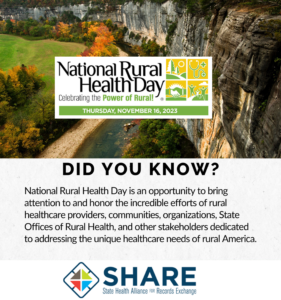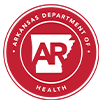Little Rock, Arkansas November 2023
National Rural Health Day, celebrated annually on the third Thursday of November, shines a spotlight on the unique healthcare challenges faced by rural communities across the United States. In Arkansas, a state marked by vast rural landscapes, National Rural Health Day takes on special significance. This occasion not only acknowledges the contributions of healthcare providers and organizations in rural areas but also emphasizes the critical role of Health Information Exchange (HIE) in addressing the healthcare needs of these communities.
The Rural Health Landscape in Arkansas: Arkansas, known for its picturesque rural settings, is home to numerous communities where access to healthcare services can be limited. Factors such as geographic isolation, a shortage of healthcare professionals, and socioeconomic challenges often create barriers to quality healthcare in these areas. National Rural Health Day serves as a platform to raise awareness about the unique healthcare needs of rural Arkansans and the innovative solutions that can bridge the healthcare gap.

The role of Health Information Exchange (HIE): Health Information Exchange plays a pivotal role in transforming healthcare delivery, especially in rural settings. HIE involves the electronic sharing of patient health information among healthcare providers and organizations, enabling seamless communication and collaboration. For rural healthcare organizations, providers, and healthcare teams, HIE offers several key benefits:
- Improved Coordination of Care: In rural areas, patients may receive healthcare services from multiple providers and facilities. HIE facilitates the secure exchange of patient information, ensuring that all healthcare providers involved in a patient’s care have access to up-to-date and comprehensive medical records. This results in more coordinated and informed care.
- Enhanced Patient Outcomes: Timely access to accurate patient information allows healthcare teams to make more informed decisions. This can lead to improved diagnosis, treatment planning, and overall patient outcomes. In rural communities, where access to specialized care may be limited, HIE becomes a valuable tool for delivering high-quality healthcare.
- Efficient Resource Utilization: Rural healthcare organizations often face resource constraints. HIE helps in optimizing resource utilization by reducing redundant tests, minimizing paperwork, and streamlining administrative processes. This efficiency translates into cost savings and a more sustainable healthcare infrastructure.
- Emergency Preparedness: In rural areas, where natural disasters or public health emergencies can have a significant impact, HIE ensures that critical health information is accessible during emergencies. This capability is crucial for timely and effective responses to crises, safeguarding the well-being of rural communities.
National Rural Health Day in Arkansas serves as a call to action, urging stakeholders to prioritize and address the unique healthcare challenges faced by rural communities. The integration of Health Information Exchange emerges as a key strategy in this effort, fostering connectivity among healthcare organizations, providers, and teams. As Arkansas continues to navigate the complexities of rural healthcare, the adoption and expansion of HIE will play a vital role in ensuring equitable access to quality healthcare services for all residents, regardless of their geographic location.


